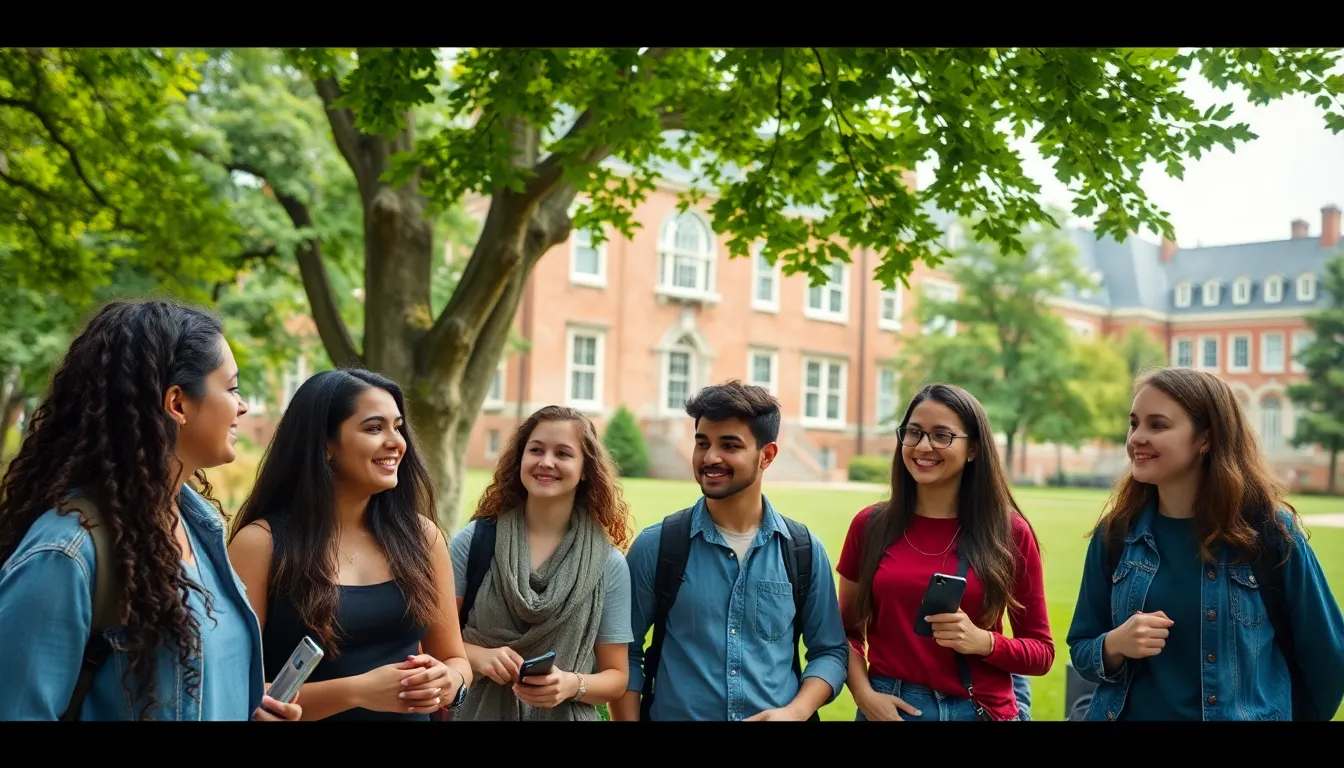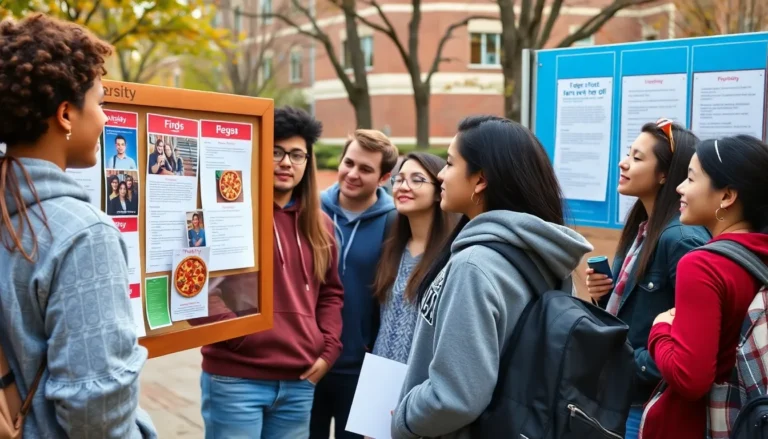Navigating the world of college exploration can feel like trying to find a needle in a haystack—if that needle was a perfect fit for your future and the haystack was full of confusing brochures and campus tours. With so many options, it’s easy to get overwhelmed. But don’t worry; this journey can be both exciting and rewarding.
Table of Contents
ToggleUnderstanding College Exploration
Engaging in college exploration is crucial for students. This phase involves evaluating various options to find a suitable environment for personal and academic growth.
Importance of College Exploration
Identifying the right college can heavily influence a student’s future. Exploring colleges helps clarify individual preferences and aspirations. Students learn about different values each institution holds and how they align with personal goals. Visits to campuses provide insights into culture, facilities, and social opportunities. Moreover, understanding academic programs offers a glimpse into career paths, allowing informed decisions.
Key Factors to Consider
Evaluating several factors helps streamline college exploration. Academic reputation holds significant weight; students should research program rankings and faculty credentials. Financial aid options must also be considered to manage tuition costs effectively. Campus culture plays a vital role; prospective students benefit from reflecting on whether a supportive community fosters their growth. Location influences daily life, so proximity to home and urban versus rural settings should factor into choices. Lastly, extracurricular activities enrich college experience, enabling students to develop interests and skills outside of academics.
Types of College Exploration

College exploration can take many forms, each providing unique insights into potential choices. Two prominent methods include on-campus visits and virtual tours.
On-Campus Visits
On-campus visits immerse students in the college environment. Prospective students interact with current students and professors, gaining immediate feedback about the academic experience. Exploring facilities, libraries, and dormitories helps clarify how daily life aligns with individual preferences. Guided tours often highlight essential resources such as tutoring centers and study spaces. Interacting with campus culture reveals social dynamics, making students feel more connected to the community. Visiting during events, like orientation or open houses, offers a glimpse into campus life and traditions.
Virtual Tours
Virtual tours serve as an accessible alternative for exploring colleges remotely. These online experiences showcase campuses through video or interactive maps, allowing students to explore from anywhere. Many institutions provide detailed overviews of academic programs and campus facilities through these tours. Virtual options make it simple to compare various campuses without the constraints of travel. Engaging with virtual information sessions and live Q&A can clarify questions regarding admissions or financial aid. Additionally, social media platforms often supplement virtual tours, providing real-time updates and insights into student life.
Resources for College Exploration
Exploring college options requires access to reliable resources. Various tools assist students in narrowing down choices and making informed decisions.
College Search Websites
College search websites serve as essential tools in the exploration process. Websites like College Board and Cappex provide comprehensive databases of colleges, including academic profiles and campus life insights. These platforms allow users to filter schools by location, majors, and size. Students can read reviews from current and former students, which offers valuable perspective on experiences. Some sites even feature financial aid calculators to estimate costs and aid opportunities. By utilizing these resources, students can streamline their search and focus on the best-fit institutions.
Guidance Counselors and Advisors
Guidance counselors and advisors play a pivotal role in college exploration. Trained professionals assist students with personalized advice tailored to individual goals and interests. They help clarify academic pathways and discuss potential career options based on chosen majors. Regular meetings ensure students receive updates on deadlines, applications, and financial aid opportunities. Counselors also provide workshops that cover important topics such as essay writing and interview preparation. Leveraging guidance from these professionals enhances the college exploration experience and boosts confidence.
Strategies for Effective College Exploration
Effective college exploration requires strategic approaches. Starting with a comprehensive college list simplifies decision-making.
Creating a College List
Creating a college list begins by setting clear criteria. Students should consider factors like academic programs, campus culture, and location. Evaluating personal preferences, such as preferred class size and extracurricular activities, narrows down options effectively. Researching colleges through authoritative resources helps gather essential information about each school. Prioritizing institutions based on fit ensures that it aligns with academic and personal goals. Students can also include safety, match, and reach schools to maintain a balanced selection. Frequent refinement of the list throughout the exploration process accommodates new insights and preferences.
Engaging with Current Students
Engaging with current students offers invaluable firsthand perspectives. Reaching out through campus events, social media, or informal meetups provides real-world insight into student life. Asking questions about academic support, extracurricular opportunities, and community engagement reveals deeper layers of the collegiate experience. Current students often share tips about navigating campus resources and balancing academics with social life. Attending open houses or student-led tours also enhances understanding of campus culture. Forming connections with prospective peers fosters a sense of belonging before even stepping on campus. Gathering these insights equips students with the knowledge needed to make informed decisions.
Conclusion
College exploration is a vital journey that shapes a student’s future. By engaging in campus visits and utilizing virtual tours students can gain invaluable insights into their potential choices. The process may seem daunting but it ultimately leads to clarity about personal aspirations and academic goals.
Leveraging reliable resources like college search websites and guidance counselors can enhance this experience. By prioritizing preferences and connecting with current students individuals can navigate their options with confidence. The right college fit can foster growth and open doors to exciting opportunities. Embracing this exploration is the first step toward a fulfilling college experience.



